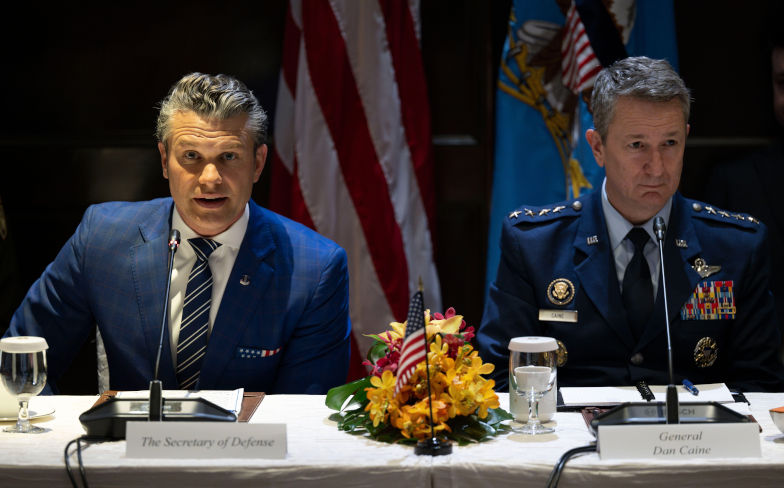Shangri-la is not Shangri-la
June 5, 2025
Asia, and China’s relationship with Asia, is a more complex environment than that understood by Pete Hegseth, Donald Trump and many in the West. This Shangri-la dialogue sought false friendship, and portended little peace and tranquillity.
The mythical Shangri-la of James Hilton’s 1933 novel is a place of friendship, peace and tranquillity. The recent Shangri-la security conference in Singapore subverted all of these concepts.
In the curious lexicon of modern US foreign relations, coercive actions are presented as evidence of friendship. US Defence Secretary Hegseth claimed that US demands for increased military co-operation in Asia were benign.
Friends should help friends was his theme, as he called for Asian allies to follow Europe’s example of heightened defence investment, citing NATO members’ pledges to allocate 5% of GDP to defence.
His demand for increased defence spending among Asian allies was not about the US promoting equitable security partnerships. It was part of shifting the burden of China containment onto regional actors.
Hegseth clearly acknowledged that the increase in defence investment would boost the US arms industry. He made no secret of this, talking of revitalising his nation’s defence industrial base as part of Trump’s broader strategy seeking new sources of income to tackle the US deficit problem
Defence spending as measured by percentage of budget is a crude measure that does not take into account access to military bases, the pre-positioning of equipment and the use of sovereign countries as an expendable buffer or launch point for attack. US friends understand that the dollar cost may be low, but the strategic contribution is significant.
Claims of friendship and sharing the burden need to be balanced against the demand that countries trading with the United States pay a minimum tariff of 10% and up to 50% or more for the privilege. Blanket tariffs are the modern equivalent of the ancient tribute system.
Those who were claimed to fall under the blanket of friendship wondered why their students were no longer welcome to study in the United States. Students from across the region, who are of Chinese ancestry, are particularly unwelcome.
In the name of friendship, those ASEAN countries with large Islamic populations were asked to ignore the way the United States has refused to accept or act on the judgments of the International Court of Justice in regard to ongoing war crimes and crimes against humanity taking place in Gaza.
In the name of benign friendship, they were asked to forget the 14 US-led invasions of Islamic nations over the past 45 years so they could welcome the friendship alliance against China.
Hegseth’s assumption that China is unwelcome in the region revealed he has an outsider’s understanding of the region and its historical and cultural connections with China.
Under the guise of extending the benevolent hand of friendship, Hegseth turned a security conference into a war conference. Despite his claims to the contrary, his inflammatory narrative was designed to escalate tensions and provide an “excuse” for US military action.
Hegseth’s statements leave no room for doubt. He emphasised an “imminent” threat from China. Clearly, America wants to attack China and is doing its best to provoke a reaction from China that the US can use as an excuse for an attack.
The enhanced US military presence and joint exercises in the Indo-Pacific increase the potential risks of miscalculation and unintended escalation. Hegseth hinted at increased probing of China’s defences through so-called freedom of navigation exercises. The US can no longer pretend that these are benign exercises and other countries in the region must also now acknowledge this.
Hegseth spoke of reviving a “warrior ethos”. This is consistent with the historical record which suggests that America’s most consistent export over the past 240-plus years is state-sponsored violence. Since 1776, the Americans have been at war for 225 years, either of their own making, like the annexation of the Philippines in 1899, as an intervening force in other wars like the Vietnam conflict, or simply initiating regime change wars against those they dislike by covertly fermenting insurrections in South America using groups like the Contras.
The US has consistently used this strategy of provocation based on lies to justify its attacks on other countries. The Pueblo incident that led to the bombing of North Vietnam remains well noted in the region. The weapons of mass destruction campaign against Iraq was built around a blizzard of lies told to the world and the United Nations.
Hegseth’s comments at the Shangri-La Dialogue carry all the lack of nuance that is expected from a former Fox News cable TV host. His comments explicitly reveal US intentions to sabotage China’s success and development. This military ambition sits alongside the economic tactics of tariffs, denial of market access and attempts to prevent China’s technological advance.
In recent months, Trump has given many reasons for Asia to suspect the quality of friendship offered by the United States. The portrayal of China as an “imminent threat” is a further stumbling block. It reflects a failure to understand that China has engaged the regions for centuries, long before America was even a glint in the eyes of European conquerors.
Asia, and China’s relationship with Asia, is a more complex environment than that understood by Hegseth, Trump and many in the West. This Shangri-la dialogue sought false friendship, and portended little peace and tranquillity.
The views expressed in this article may or may not reflect those of Pearls and Irritations.

